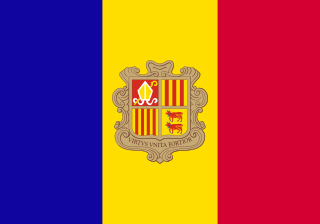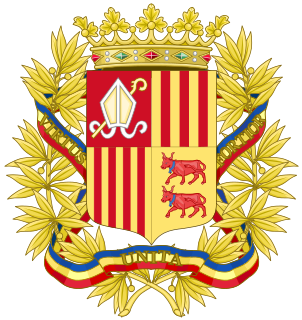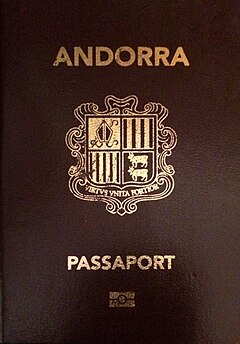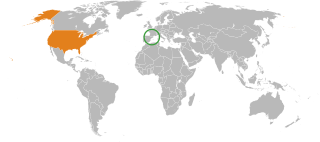Related Research Articles

Andorra, officially the Principality of Andorra, is a sovereign landlocked microstate on the Iberian Peninsula, in the eastern Pyrenees, bordered by France to the north and Spain to the south. Believed to have been created by Charlemagne, Andorra was ruled by the count of Urgell until 988, when it was transferred to the Roman Catholic Diocese of Urgell. The present principality was formed by a charter in 1278. It is headed by two co-princes: the Bishop of Urgell in Catalonia, Spain and the President of France. Its capital and largest city is Andorra la Vella.
Andorra, officially the Principality of Andorra, also called the Principality of the Valleys of Andorra, is a sovereign landlocked microstate in Southwestern Europe, located in the eastern Pyrenees mountains and bordered by Spain and France.

The politics of Andorra take place in a framework of a parliamentary constitutional monarchy, and a multi-party system. Executive power is exercised by the government, with the Head of Government of Andorra as chief executive. Legislative power is vested in both the government and parliament. The judiciary is independent of the executive and the legislature.

Liberal International (LI) is the political international federation for liberal political parties. It was founded in Oxford in 1947, and has become the pre-eminent network for liberal parties and for the strengthening of liberalism around the world. Its headquarters are at 1 Whitehall Place, London, SW1A 2HD within the National Liberal Club. The Oxford Manifesto describes the basic political principles of the Liberal International. At the moment LI has 111 parties and organizations.

The national flag of the Principality of Andorra features a vertical tricolor of blue, yellow, and red with the coat of arms of Andorra in the center. Although the three vertical bars may at first appear to be of equal width, the centre yellow bar is slightly wider than the other two so that the ratio of bar widths is 8:9:8 with an overall flag ratio of 7:10.
Andorra is essentially Catalan speaking. The country has contributed significantly to the Catalan heritage.

The co-princes of Andorra are jointly the heads of state of the Principality of Andorra, a landlocked microstate lying in the Pyrenees between France and Spain. Founded in 1278 by means of a treaty between the bishop of Urgell and the Count of Foix, this unique diarchical arrangement has persisted through medieval times to the 21st century. Currently, the bishop of Urgell and the president of France serve as Andorra's co-princes, following the transfer of the count of Foix's claims to the Crown of France and, thence, to the president of France. Each co-prince appoints a personal representative, the French co-prince currently being represented by Patrick Strzoda and the Episcopal co-prince by Josep Maria Mauri.

Boris Mikhailovich Skossyreff was a Russian adventurer, international swindler and pretender who attempted to seize the monarchy of the Principality of Andorra during the early 1930s, styling himself King Boris I of Andorra.

The Constitution of Andorra is the supreme law of the Principality of Andorra. It was adopted on 2 February 1993 and given assent by the Andorran people in a referendum on 14 March 1993. According to the Constitution itself, it was to enter into force on the day of its publication in the Butlletí Oficial del Principat d'Andorra, which occurred on 28 April 1993.

According to the US Religious Freedom Report of 2006 there are about 2000 North Africans currently living in Andorra and they are the largest Muslim group in the country.

The Andorran passport is issued to Andorran citizens for international travel.
The Constitution of Andorra provides for freedom of religion, and the Government generally respects this right in practice. There is no state religion; however, the Constitution acknowledges a special relationship with the Roman Catholic Church, which receives some privileges, although no direct subsidies, not available to other religious groups. There are no reports of societal abuses and discrimination based on religious belief or practice.

Human Rights in Andorra are guaranteed under the Andorran constitution. The State Department considers Andorra to have few human rights concerns.

Andorra and the United States enjoy friendly relations. Diplomatic relations between both nations were established on 21 February 1995 after Andorra adopted a constitution establishing itself as a sovereign parliamentary democracy. Since 2000, Andorra has participated in the U.S. Fulbright Exchange Program and works together with the United States on sharing of confiscated proceeds and instrumentalities of crimes.
Listed below are articles about or related to Andorra, arranged alphabetically:
The first Paréage of Andorra was a feudal charter signed in Lleida on 8 September 1278. It codified a lay and ecclesiastical agreement between the Count of Foix, Roger-Bernard III, and the Bishop of Urgell, Pere d'Urtx, establishing their joint sovereignty over the territory of Andorra. The paréage established the system of condominium in Andorra, placing it under suzerainty of both lords. This system was later ratified in 1993 by the signing of the Constitution of Andorra.

Casa dels Russos is a historical house in Santa Coloma d'Andorra, Andorra la Vella parish, Andorra. In the early 1930s, it was the residence of the Boris Skossyreff, who styled himself King of Andorra. It is a heritage property registered in the Cultural Heritage of Andorra. Designed by Cesar Martinell, it is built in a combination of Catalan Modernisme and Noucentisme styles.

Legally, women in Andorra have equal rights under the laws of the Principality of Andorra. Politically, Andorran women won 15 out of 28 in seats in the country's legislature during the parliamentary election of 2011. For this reason, Andorra became the first nation in Europe and the second country internationally to have elected a "majority female legislature".
An uncodified constitution is a type of constitution where the fundamental rules often take the form of customs, usage, precedent and a variety of statutes and legal instruments. An understanding of the constitution is obtained through reading commentary by the judiciary, government committees or legal experts. In such a constitutional system, all these elements may be recognized by courts, legislators and the bureaucracy as binding upon government and limiting its powers. Such a framework is sometimes imprecisely called an "unwritten constitution"; however, all the elements of an uncodified constitution are typically written down in a variety of official documents, though not codified in a single document.
References
- ↑ Luengo, Andrés (February 3, 2006). "Borís, rei d'Andorra". Presència.